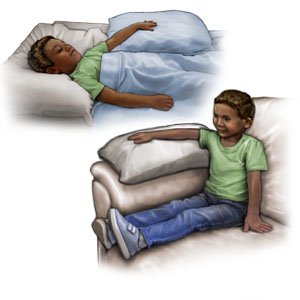Closed Reduction Internal Fixation of Upper Extremity Fracture in Children
Medically reviewed by Drugs.com. Last updated on Aug 4, 2025.
AMBULATORY CARE:
Closed reduction internal fixation (CRIF)
is a procedure to fix your child's broken bone. Your child's healthcare provider will move your child's bones back into the correct place. He or she may be able to do this without an incision being made over the break. Pins and wires are used to hold the pieces of bone in place. Screws and metal plates may also be used.
Prepare your child for a CRIF:
Your child's healthcare provider will tell you how to prepare your child for surgery. He or she may tell you to not let your child eat or drink anything after midnight the night before the surgery. Your child's healthcare provider will tell you what medicines your child should take or not take.
What will happen during a CRIF:
- Your child may be given general anesthesia to keep him or her asleep during the surgery. The anesthesia will also keep your child pain free during the surgery. Your child may be given an antibiotic through the IV to decrease the risk for infection.
- Your child's healthcare provider will use an x-ray machine to help place the bones into the correct position. Once the bones are positioned correctly, pins and wires may be used to hold the bones in place. Instead, your child's healthcare provider may make an incision and place flexible screws. Or, place metal plates to hold the bones in place. The incision will be closed with stitches. Your child's healthcare provider will apply a splint or cast over your child's arm or hand. This will prevent movement and help the bones heal.
What will happen after a CRIF:
Your child will be monitored until he or she is fully awake. When the bone is healed, your child's healthcare provider may remove the pins, wires, and screws. Once the devices are removed, your child may need to participate in therapy. Physical and occupational therapies may help your child gain strength and keep complete range of motion in the operated arm.
Risks of a CRIF:
Your child may bleed more than expected or get an infection. Your child's healthcare provider may not be able to position the fracture correctly using a closed procedure. Your child's broken bone may not heal correctly. Your child may continue to have pain. The internal fixation devices may break or change shape. Your child may need another surgery to remove the internal fixation device. Nerves, blood vessels, ligaments, or muscles may be damaged during surgery.
Call 911 for any of the following:
- Your child feels lightheaded, short of breath, or has chest pain.
- Your child coughs up blood.
Seek care immediately if:
- Your child has severe pain, even after taking medicine.
- Your child's cast or splint breaks.
- Your child cannot move his or her arm or fingers.
- Your child has tingling or numbness in his or her arm or fingers.
Contact your child's healthcare provider if:
- Your child has a fever or chills.
- Your child's cast or splint gets wet or begins to smell.
- Your child's bandage or cast feels too tight or too loose.
- Your child has a lot of itching under the cast or splint.
- You have questions or concerns about your child's condition or care.
Medicines:
Your child may need any of the following:
- Prescription pain medicine may be given. Ask your how to give this medicine safely to your child.
- Acetaminophen decreases pain and fever. It is available without a doctor's order. Ask how much to give your child and how often to give it. Follow directions. Read the labels of all other medicines your child uses to see if they also contain acetaminophen, or ask your child's doctor or pharmacist. Acetaminophen can cause liver damage if not taken correctly.
- Give your child's medicine as directed. Contact your child's healthcare provider if you think the medicine is not working as expected. Tell the provider if your child is allergic to any medicine. Keep a current list of the medicines, vitamins, and herbs your child takes. Include the amounts, and when, how, and why they are taken. Bring the list or the medicines in their containers to follow-up visits. Carry your child's medicine list with you in case of an emergency.
Care after surgery:
- Apply ice to the area. Ice helps decrease swelling and pain. Ice may also help prevent tissue damage. Use an ice pack or put crushed ice in a plastic bag. Cover it with a towel and place it on your child's fractured area for 15 to 20 minutes every hour or as directed.
- Elevate your child's arm as directed. Raise your child's arm above the level of his or her heart as often as you can. This will help decrease swelling and pain. Prop your child's arm on pillows or blankets to keep it elevated comfortably.

- Do not allow your child to stick anything into his or her cast or splint. Hangers and other items can get stuck in your child's cast. These items can also cause injury to the skin.
- Keep your child's splint or cast dry. Place a plastic bag over the splint or cast before your child bathes. Tape the bag to your child's skin to keep water out.
- Limit your child's activity. Do not allow your child to do activities that could cause a fall or injury. Ask your child's healthcare provider when he or she can return to usual activities, such as playing sports.
- Give your child foods with calcium and vitamin D. Calcium and vitamin D help fractures heal. Examples of high calcium foods include kale, spinach, salmon, and fortified orange juice and some breakfast cereals. Tuna, fortified milk and some cheeses, egg yolks, and soy milk are examples of vitamin D foods.

- Take your child to therapy as directed. A physical therapist teaches your child exercises to help improve movement and strength, and to decrease pain. An occupational therapist teaches your child skills to help with daily activities.
Follow up with your child's healthcare provider as directed:
Your child may need x-rays to see if his or her fracture is healing. The fixation devices may need to be removed. Your child's cast may need to be changed. Write down your questions so you remember to ask them during your child's visits.
© Copyright Merative 2025 Information is for End User's use only and may not be sold, redistributed or otherwise used for commercial purposes.
The above information is an educational aid only. It is not intended as medical advice for individual conditions or treatments. Talk to your doctor, nurse or pharmacist before following any medical regimen to see if it is safe and effective for you.
Further information
Always consult your healthcare provider to ensure the information displayed on this page applies to your personal circumstances.
